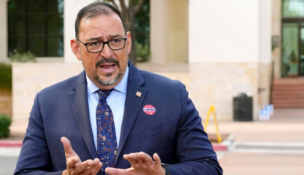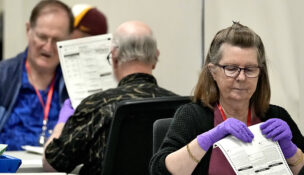Bill advances allowing Treasurer to hire own attorneys
Arizona Capitol Reports Staff//February 27, 2009//[read_meter]
Bill advances allowing Treasurer to hire own attorneys
Arizona Capitol Reports Staff//February 27, 2009//[read_meter]
The House Government Committee voted along party lines to approve legislation that would add the State Treasurer’s Office to an existing list of government agencies able to contract their own attorneys separate from the Attorney General’s Office.
The bill, H2103, proposed by the committee’s chairman, Rep. Sam Crump of Anthem, was supported by the committee’s Republican members. Democrat Reps. Chad Campbell, Anna Tovar and Tom Chabin opposed the measure.
The legislation was urged by State Treasurer Dean Martin, a Republican who has feuded with Attorney General Terry Goddard, a Democrat, over the legality of payments destined for Goddard’s office from funds recovered from a 2002 fraud case that cost various Arizona governments approximately $131 million.
Martin contends he should be granted the flexibility to hire outside counsel to help advise the State Treasurer’s Office on complex financial matters outside the expertise of the Attorney General’s Office.
Assistant Attorney General Greg Stanton lobbied against Martin’s contention, although unsuccessfully, by arguing that granting the treasurer the ability to seek independent counsel could lead to conflicting interpretations of state law.
“The state needs to speak with one voice when it comes to important matters of interpreting statute, legal issues and whatever is going on with litigation,” said Stanton, a former Phoenix City Council member. “The more state agencies with independent counsel, the greater the chance of conflicting interpretations,” he said.
He also said it was important to protect the integrity of a fund established to collect debts owed to the state.
By state law, 35 percent of recovered funds must be transferred to the account and the Attorney General’s Office is permitted to use the money to help pay expenses incurred during collection efforts.
“The purpose of this fund is to create a self-sustaining fund so that the attorney general doesn’t have to go back to the Legislature every year and ask for an appropriation for collection and bankruptcy attorneys,” Stanton said.
Stanton downplayed the political dispute between the Goddard and Martin, saying instead that the debate over the Treasurer’s Office’s access to outside counsel remains a matter of policy. He declined to address questions regarding the effectiveness of a state law that allows nine agencies to hire their own attorneys.
Likewise, Martin minimized the clash with Goddard, saying other factors are more important, such as securing the authority to hire expert private counsel without having to gain the approval of the Attorney General’s Office, which he said he has not been granted to him despite making several requests on different matters.
He also said private attorneys can be hired at rates cheaper than the 35 percent cut taken by the Attorney General’s Office from recovered funds, leaving a greater contribution to the state’s general fund.
On top of that, Martin said private attorneys cannot, by themselves, be used to escape or outmaneuver legal positions of Goddard that he may not agree with.
“If he (Goddard) issues an opinion, that stands, no matter who my attorney is,” he said. “The AG’s opinion has the force of law without a court case to test it.”
The issue of the treasurer’s access to independent counsel stems from a lengthy dispute between Goddard and Martin over a legal bill Martin’s office was asked to pay in return for money recouped in a national fraud settlement.
The fraud cost Arizona governments approximately $131 million. Two-hundred local Arizona governmental entities and many governments in other states invested in NCFE, which made loans to inner-city Medicare hospitals, before collapsing in 2002 in a fraud case involving $3 billion in lost investments.
After the legal battle, then-Chief Deputy Treasurer Blaine Vance refused to transfer payment for the attorney general’s legal services without written approval from the state solicitor general. But in June 2006, the state Treasurer’s Office agreed to pay the Attorney General’s Office $1.9 million for legal expenses associated with recouping the lost investments.
The payment was not disclosed to the state Board of Investment, which oversees the state’s investment portfolio.
The deal came months after agents with Goddard’s office seized computers, 15,000 pages of documents and other materials from the Treasurer’s Office as part of an investigation into allegations that then-Treasurer David Petersen had committed several felonies by using his office to promote character-building teaching materials sold by Character First.
Initially, Petersen faced charges of theft, fraud and conflict of interest. But weeks after resigning in October 2006, he pleaded guilty to a single misdemeanor count for failing to disclose a $4,200 commission he received for selling Character First products.
Martin, as a candidate running for treasurer in 2006, cast suspicion on the payment and criticized Petersen’s sentence, which included three years of probation, as a “slap on the wrist.”
Goddard has defended the payment repeatedly.
Upon taking office, Martin stopped issuing Goddard’s office a portion of the fraud settlement, which was being distributed to the state periodically. He also asked Maricopa County Attorney Andrew Thomas and Maricopa County Sheriff Joe Arpaio to investigate the former treasurer’s payment to the attorney general.
Martin has asked for separate legal counsel to review the deal and to conclude how much the Attorney General’s Office should be paid. The treasurer has pointed out on numerous occasions that a Texas law firm helped recover funds from the NCFE case, saying he is not sure whether Goddard’s office is entitled to the full 35 percent.
The state treasury lost $14.3 million to NCFE. So far, Arizona has recovered about 53 percent of $131 million in losses to various governmental entities, according to the Treasurer’s Office.

















